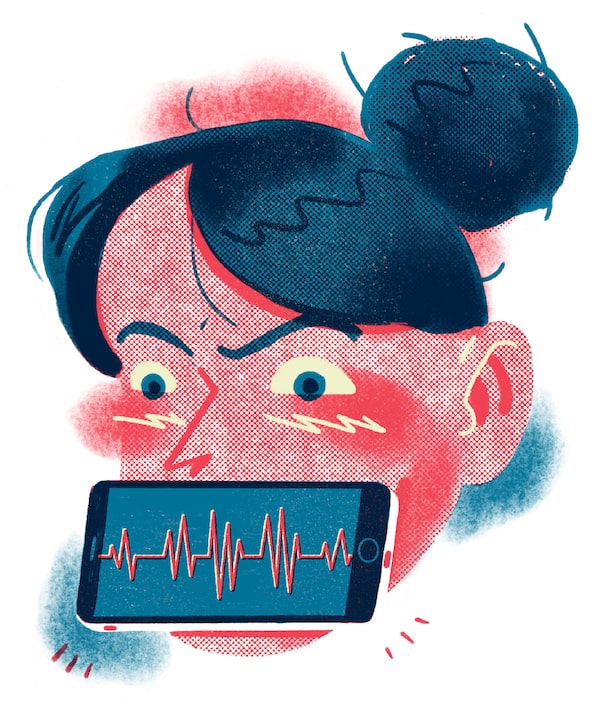
Illustration by Drew Shannon
First Person is a daily personal piece submitted by readers. Have a story to tell? See our guidelines at tgam.ca/essayguide.
It’s 2 a.m. and I’m lying on a hospital cot. The hall is crowded with patients waiting for attention. I’m one of the lucky ones. I got here early enough to claim my own space. I’m hooked up to a heart monitor. I’ve already had two electrocardiograms. I’ve swallowed down clot-busting drugs and Aspirin. A nurse has injected a blood thinner into my stomach. I’ve had nitroglycerine sprayed under my tongue. I have an IV in my arm ready, just in case.
A nurse walks by and declares that tonight the emergency department is a “train wreck.”
Every time my monitor beeps, my heart rate skyrockets. What could the beeping mean? I’m shaking, trying to remember my yoga breathing. My nurse assures me she’s watching me like a hawk, but I haven’t seen her for hours. Stress consumes me. How in the world did I get here?
I have always been a patient person. I don’t fly off the handle, I tend to rationalize situations and approach conflict with an informed calmness. But lately, this is not the case. I’m angry. I can’t stand to wait, to be inconvenienced. I have turned into someone I don’t recognize.
My muscles tense up when I look at my Twitter feed. My teeth clench when I look at Facebook. As a writer, I’ve been told to show, not tell and, right now, I’m overwhelmed in the telling. The multitude of voices telling me things that I really don’t want or need to know. I crave approval, the need for others to know what I’m doing and like it. I feel let down when I don’t get enough of this virtual attention.
I get angry when I have to wait in line for coffee because the customers haven’t even looked at the menu before they arrived at the front of the line. I lose patience with people in cars who block parking lots while they wait at the drive-through. I’m frustrated when my movie won’t play because the internet is slow at the cottage.
Just like my children, I’m being programmed to expect instant gratification. I no longer have the ability to wait. I can no longer revel in boredom and nothingness. I’m in a hospital bed staring at the wall. I can’t use my cellphone because it’s almost dead and then I will lose contact with everyone. I count the cracks in the ceiling tiles and, for the first time in a long time, I can think.
How has excitement and anticipation turned to rage? How has eagerly pressing redial as a teenager to buy concert tickets turned into the intense frustration of repeatedly hitting the refresh button? Life has turned into a race and the other runners are disappearing over a hill in front of me. I’m at the bottom about to hurl myself down on the pavement.
We are expected to be fed within minutes of ordering. To be hurtled through a checkout line. To text back within seconds. To answer e-mails in a matter of hours. My children don’t understand what it means to wait an entire week to watch the next episode of a TV show. This inability to pause cuts into our reflection time, our introspection time. We feel rushed and overbooked.
Throughout history, there has been a multitude of technological innovations and humans have adapted to these changes. Innovation has made our lives easier and faster. But faster does not always mean better. Do I really need a device to make instant meals? It may free up my time to do other things but the whole process of cooking calms and relaxes me and that’s important, too. Technology is a necessity that can help us in so many ways. It’s when it starts to control our lives that we need to pause and take a step back.
Almost everyone I know in the Greater Toronto Area has a memory to share from the summer blackout of 2003. Everything slowed down, for hours. People left their houses, abandoned their phones and actually began to connect with one another, to look out for one another. Society took a quiet collective breath.
In the emergency room, the doctor orders one more test and then I am given my freedom by lunch time. I will have to go back for an echocardiogram and a stress test. They don’t know why my cardiac enzymes were slightly elevated. The pain I felt is most likely inflammation around the heart caused by a virus.
But I know better. The rage has spilled over into my blood.
At home, I’m afraid to do anything. I’m afraid to move. What if the doctors are wrong? What if the next chest pain will be the end? I sit on the couch. I breathe. I stare at my phone. The place where everything and nothing exists. And then I delete my Facebook app. I delete Instagram. I delete Twitter. I delete my e-mail icon. I can no longer keep these at my fingertips. Layers of tightness fall away, just like when the nurse sprayed the nitro under my tongue. I make a vow to never reinstall these apps. When I’m out with my family, I will stay focused on them. I will do yoga in the mornings. I will park my car and avoid the drive-through. I will celebrate my moments of boredom. I will reconnect with the physical world. I will detach myself from the rage.
I take my coffee out onto the front porch and watch the world go by. Showing, not telling. Just the way it should be.
Allison Hall lives in Bolton, Ont., and still hasn’t reinstalled social media on her phone.